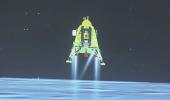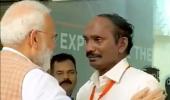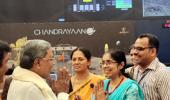'Perhaps the government should explain how the same scientific temper, which authored a precise landing for Chandrayaan-3, finds the periodic table and the theory of evolution not good enough for inclusion in the educational curriculum,' asserts Shyam G Menon.
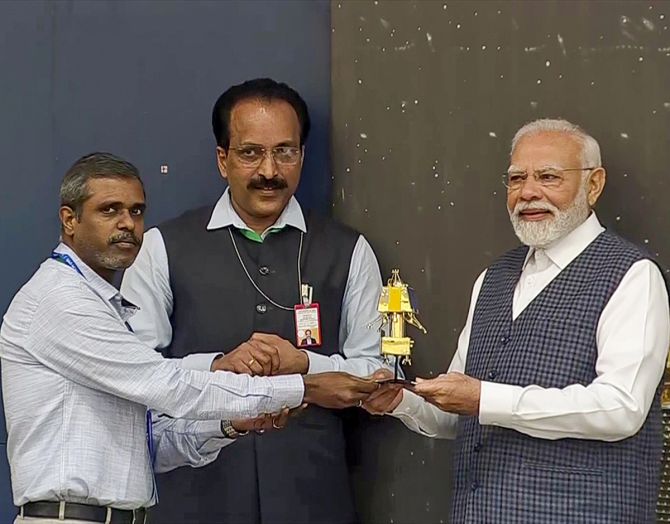
Night of August 23, 2023, my quest to stay off the herd failed.
I had nothing against the day's top billed event of an Indian probe landing on the Moon.
I merely wished to reflect on it alone, in peace; minus the compulsion to join the crowd.
Given reflection, inquiry and originality seem better the farther I am from collectives, Chandrayaan-3, like so many other social media fuelled picturisations these days, appeared best savoured in retrospect.
After the celebrations are over and the revellers have left. My friend, however, managed to land his WhatsApp message on my quiet island. 'Congratulations on Chandrayaan' -- it said.
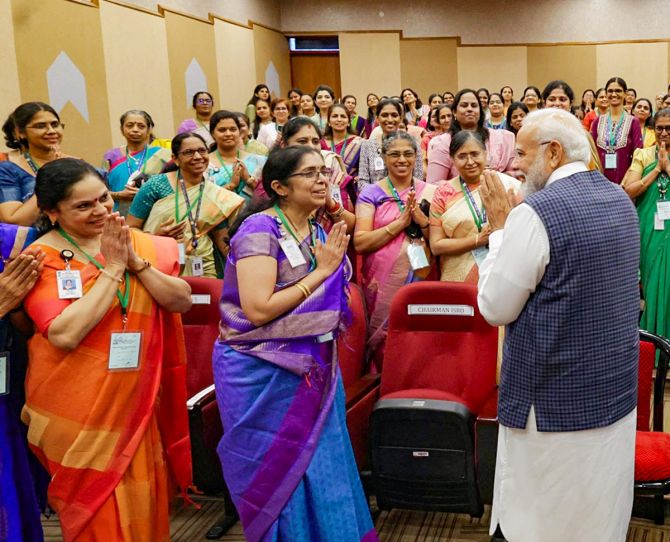
I was puzzled. For a minute I felt like a top director of the Indian Space Research Organisation (ISRO) or an Elon Musk, owning a company that sends rockets to space.
I wondered what I personally had to do with Chandrayaan's success and what the probe's fate may have been if I, notoriously weak in science and math in school and happy to eke a livelihood since in areas demanding much less precision, had anything to do with it.
Then I realised it was my friend's euphoria. Like millions of others, he must have felt proud as an Indian to see a probe made by scientists from his country, land on the lunar surface.
So, even as I was guilty of not having watched the live telecast, I responded with a picture of the moon showing a thumbs up, silently hoping alongside that despite my ignorance of modern emojis and such, what I had chosen was just what it appeared to be with no hidden message attached.
But I did wish one thing for my friend, who I have known for years notwithstanding our divergent political beliefs.
I wished that his zeal stops short of the herd transforming to the sort that makes laughing at ourselves, impossible.
In the days before the probe's landing, a leading actor had been booked for no more than sharing a joke on the subject.
Compared to Earth and its tidal waves on social media, the Moon sure seems a very quiet place.
Provided one is spared meteorites and has space suit and oxygen tank for company, it should be a nice perch to look at Earth and humanity from far and learn to appreciate afresh what the blue planet actually means.
A bit like death, I suppose; for its towards life's end that we manage to discard our coloured lenses and see existence clearly.
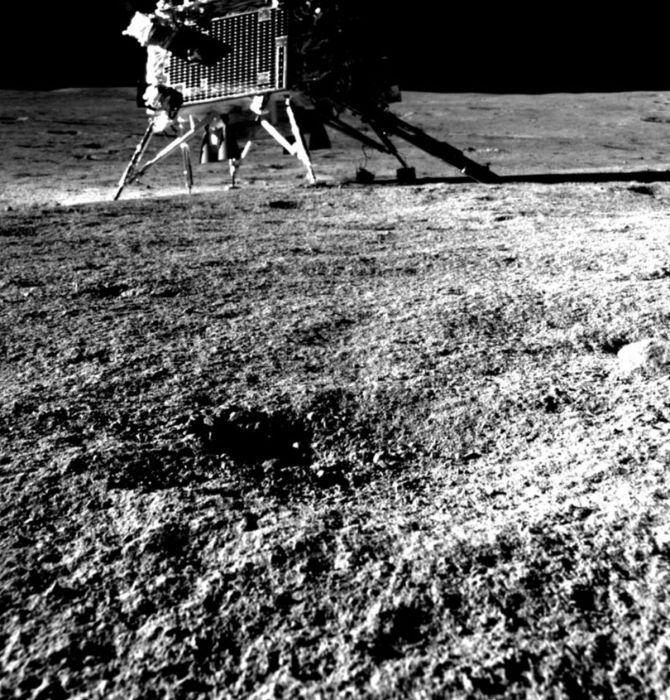
There was also another thing I hoped for in the thoughts stemming from my friend's message.
Between celebrating success by science and celebrating science itself lay a vast difference.
On August 23 (now National Space Day), there was no shortage of preening in someone else's limelight.
In the build-up to its rendezvous with the Moon, everyone latched on to Chandrayaan-3. People prayed for its success.
Post lunar landing by the probe, our top political leadership quickly lauded the scientists and spoke of new goals for ISRO to focus on after the Moon -- the Sun, Mars etc.
Forgotten amidst the leveraging of Chandrayaan-3 for political mileage was how not long ago, personalities from the same ruling dispensation were only too happy to put faith above science (the bulk of Right-Wing politics was driven by faith) and even introduce questionable curriculum at our educational institutions.
There have been media reports about the periodic table and the theory of evolution not finding favour any longer with those deciding curriculum.
Don't periodic table and evolution matter in ruminations beyond probe landed on the Moon? In say -- the geology of the moon and other surfaces humans elect to explore; not to mention, that ever-intriguing question of life elsewhere in the universe?
Shouldn't a country celebrating Chandrayaan this hugely wonder why a seemingly questionable science curriculum appears alright for its future generations? After all, isn't all this -- from periodic table to Darwin and Chandrayaan -- the same observation and verification-based approach to knowledge?
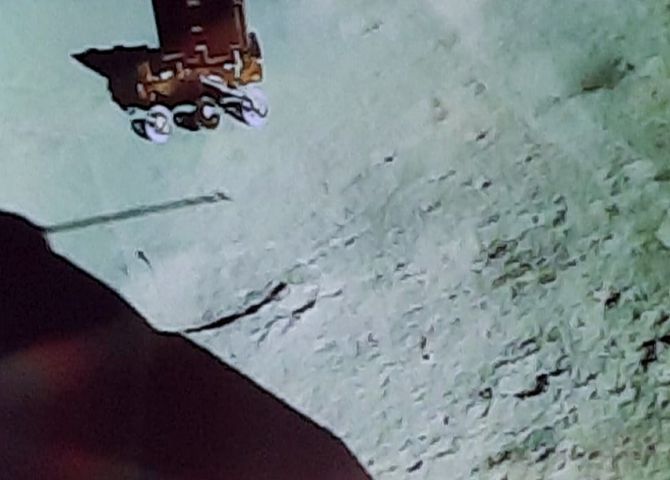
Still, lack of introspection appeared the name of the game in politics.
On August 26, 2023, Press Trust of India reported Prime Minister Narendra D Modi saying that the excitement generated by Chandrayaan should be channelised to power scientific temper among youngsters.
The real challenge in Chandrayaan-3, as one understood, was landing the probe near the Moon's south pole.
It was achieved thanks to the science, technology and math that converged for the purpose; something applauded by many.
Perhaps the government should retain the above optics and explain, how the same scientific temper, which authored a precise landing for Chandrayaan-3, finds the periodic table and the theory of evolution, not good enough for inclusion in the educational curriculum.
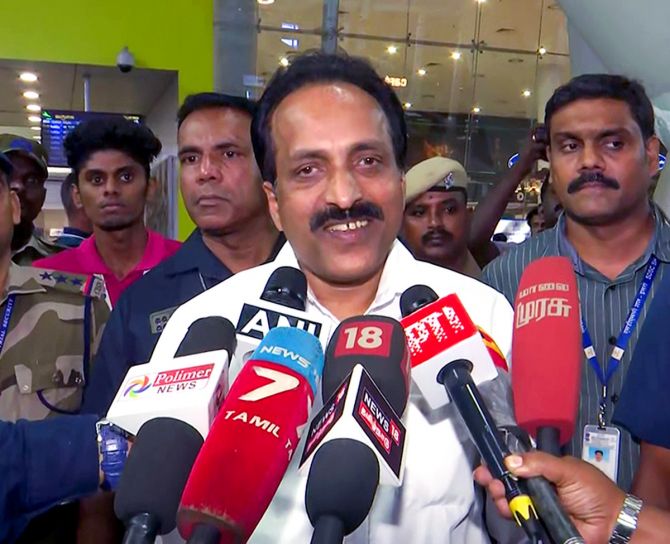
To the government's advantage, herds around science are rarely as vociferous as herds around success.
A probe on the Moon is a picture of India's success, which we love to shout from the rooftop.
The question is -- should we leave it at that or should we also make sure that science and scientific temper stay robust in India?
A lot of the Indian Right-Wing's aversion towards Western science is born from its desire to stamp comprehensive ownership over the origins of Indian creativity and excellence.
Does it really matter if our ancients were wiser than ancients elsewhere when our present, despite Chandrayaan, remains a daily struggle? Or thanks to Chandrayaan, looks promising?
For heaven's sake, let's live in the present.
Viewed from the Moon, none of this cultural competition probably makes sense because Earth's satellite is devoid of human presence and the baggage of religious and cultural schisms it brings.
Getting to the moon, being there, getting back from there -- for all that, what counts are the laws of the wider universe.
It's why for many of us -- those tutored in science and otherwise -- the Moon matters. It's a refuge from humanity's madness. At least for now.
Shyam G Menon is a freelance journalist based in Mumbai.
Feature Presentation: Rajesh Alva/Rediff.com
